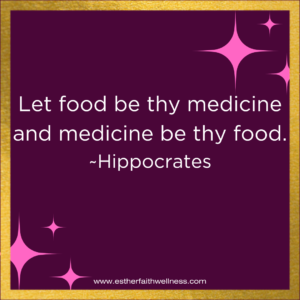
“Let food be thy medicine and medicine be thy food.” This famous quote attributed to Hippocrates, the ancient Greek physician and father of Western medicine, highlights a concept that has stood the test of time—food’s potential to not only nourish our bodies but also to heal and prevent illness. In recent years, there has been a growing recognition of the profound impact that dietary choices can have on our overall health. From boosting our immune systems to reducing the risk of chronic diseases, the connection between food and medicine is becoming increasingly apparent. In this blog post, we will explore the fascinating concept of how food can be medicine.
Nutrient-Rich Powerhouses
A balanced and nutrient-dense diet is a cornerstone of good health. Vitamins, minerals, antioxidants, and phytochemicals found in whole foods play essential roles in supporting our immune systems, cellular repair, and overall well-being. For instance:
- Antioxidants: Fruits and vegetables are rich in antioxidants, such as vitamin C, vitamin E, and beta-carotene. These compounds help neutralize harmful free radicals in the body, reducing the risk of chronic diseases like heart disease and cancer.
- Omega-3 Fatty Acids: Fatty fish, flaxseeds, and walnuts are excellent sources of omega-3 fatty acids, which have anti-inflammatory properties and can support heart and brain health.
- Fiber: Whole grains, legumes, and vegetables are high in fiber, which aids digestion, regulates blood sugar levels, and promotes a healthy gut microbiome.
- Probiotics: Foods like yogurt, kefir, and sauerkraut contain beneficial bacteria that support gut health and have been linked to improved immune function and mental well-being.
Prevention is the Best Medicine
The old adage “an ounce of prevention is worth a pound of cure” holds true when it comes to using food as medicine. Many chronic diseases, such as type 2 diabetes, cardiovascular disease, and certain types of cancer, are influenced by lifestyle factors, including diet. Making informed food choices can significantly reduce the risk of developing these conditions.
- Mediterranean Diet: This diet emphasizes whole foods, including fruits, vegetables, whole grains, lean proteins, and healthy fats like olive oil. Studies have shown that adhering to a Mediterranean diet can lower the risk of heart disease, stroke, and cognitive decline.
- DASH Diet: The Dietary Approaches to Stop Hypertension (DASH) diet focuses on reducing sodium intake while increasing potassium-rich foods, like fruits and vegetables. This approach can help manage blood pressure and reduce the risk of hypertension.
- Plant-Based Diets: Vegetarian and vegan diets, when well-balanced, can provide numerous health benefits, including weight management, improved blood sugar control, and a lower risk of certain cancers.
Healing Through Nutritional Therapy
In some cases, specific diets tailored to individual health conditions can be used as complementary therapies. Nutritional therapy involves using targeted diets to address health concerns and promote healing. For instance:
- Gluten-Free Diet: Individuals with celiac disease must avoid gluten-containing grains to prevent damage to the small intestine. This dietary change is crucial for managing the condition and preventing long-term complications.
- Low-FODMAP Diet: This diet can help individuals with irritable bowel syndrome (IBS) manage symptoms like bloating, gas, and abdominal pain by avoiding certain fermentable carbohydrates.
- Ketogenic Diet: Originally developed to manage epilepsy, the ketogenic diet is high in fat and low in carbohydrates. It has gained attention for its potential to support weight loss and manage conditions like epilepsy, type 2 diabetes, and even certain neurological disorders.
Conclusion
The saying “food is medicine” captures the essence of a profound truth that is increasingly backed by scientific research. The choices we make at the dining table can have a profound impact on our health and well-being. By focusing on whole, nutrient-rich foods and adopting dietary patterns that align with our individual health needs, we can harness the power of food to prevent illness, support healing, and promote a lifetime of vitality. As we continue to delve into the intricate relationship between nutrition and health, it’s clear that Hippocrates’ wisdom remains as relevant today as it was centuries ago.
Food plays a huge role in our day-to-day wellness but it is only one of the many important factors to good health. Contact me today to see how my health coaching services can help you feel your best everyday.
